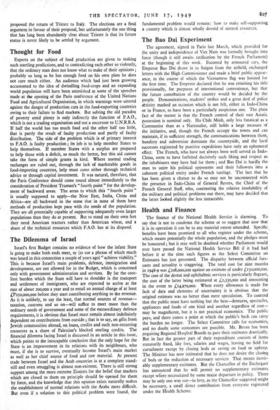Thought for Food
Experts on the subject of food production are given to making such startling predictions, and to contradicting each other so violently, that the ordinary man does not know what to make of their opinions ; probably so long as he has enough food on his own plate he does not care much either. An audience which had just been growing accustomed to the idea of dwindling food-crops and an expanding world population will have been astonished at some of the speeches made at the opening of the Paris conference of the United Nations Food and Agricultural Organisation, in which warnings were uttered against the danger of production cuts in the food-exporting countries owing to their failure to find markets. But solving the old paradox of •poverty amid plenty is only indirectly the function of F.A.O., which is not a trading organisation and not a successor to U.N.R.R.A. If half the world has too much food and the other half too little, that is partly the result of faulty production and partly of faulty distribution. The side of the problem which is of primary interest to F.A.O. is faulty production ; its job is to help member States to help themselves. If member States with a surplus are prepared to help those with a deficit, so much the better, but this aid cannot take the form of simple grants in kind. Where normal trading exchanges are ruled out, through the lack of marketable goods in food-importing countries, help must come either through technical advice or through capital investment. It was natural, therefore, that the Paris Conference should come round almost immediately to the consideration of President Truman's " fourth point" for the develop- ment of backward areas. The areas to which this " fourth point " is usually supposed to apply—the Near East, India, China and Africa—are all backward in the sense that in none of them have methods of production kept pace with the needs of the population. They are all potentially capable of supporting adequately even larger populations than they do at present. But to stand on their own feet they need American tractors rather than American wheat, and a share of the technical resources which F.A.O. has at its disposal.






































 Previous page
Previous page